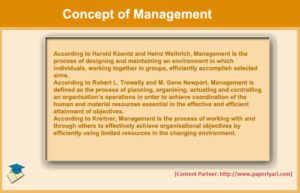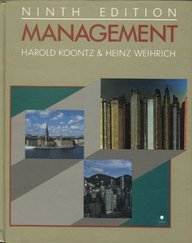

PUNJAB TECHNICAL UNIVERSITY.pdf Download Mba-04.pdf - Sr Author Books Publisher 1 Harold. Koontz & Heinz Weihrich Essentials of Management.
Contents • • • • • • Quotes [ ] • [ can be defined as] the function of getting things done through others. • Harold Koontz and (1955), Principles of Management: An Analysis of Managerial Functions. New York: McGraw-Hill, 1955, p. 3; As cited in Wren & Bedeian (2009;411) • are subject to important limitations. A chart shows only formal authority relationships and omits the many significant informal and informational relationships.
• Harold Koontz and Heinz Weihrich (2006) Essentials Of Management. • I see too many academics forgetting what I think our job is in, and that is to organize available; develop new knowledge, of course, but organize it in such a way that it can be useful to practicing managers to underpin management. I am surprised as I watch the literature, that some people are discovering what we’ve known for years. For example, some things like this: that technology affects management organization.

I found that out when I was in the airline industry a few years ago and I never thought it was anything very surprising. Another, that the actual managing depends on the situation. I thought, my gosh, there must be something new there. Only to find, after spending a lot of time reading, that there wasn’t anything, and I don’t know any practicing manager who doesn’t manage in light of the situation. I think we have to agree that and science should underpin practice, otherwise why develop it? • Harold Koontz in: Ronald G. Harold Koontz: A Reminiscence Presented at the meetings of the Academy of Management, Boston, August 14, 1984; as cited in Wren & Bedeian (2009;419-420) 'The Management Theory Jungle,' 1961 [ ] Harold Koontz, 'The Management Theory Jungle,' Journal of the Academy of Management, 4 (December 1961), pp.
Flashpoint: Rising Dragon If not?? Operation flashpoint dragon rising download torrent tpb pc.
• Although students of management would readily agree that there have been problems of since the dawn of organized life, most would also agree that systematic examination of management, with few exceptions, is the product of the present century and more especially of the past two decades. 174 • The Management Process School: This to perceives management as a process of getting things done through and with people operating in organized groups. It aims to analyze the process, to establish a conceptual framework for it, to identify principles underlying it, and to build up a theory of management from them.
It regards management as a universal process, regardless of the type that the environment of management differs widely between enterprises and levels. It looks upon management theory as a way of organizing experience so that practice can be improved through research, empirical testing of principles, and teaching of fundamentals involved in the management process. 175-6 • Empirical School; A second to management I refer to as the 'empirical' school. In this, I include those scholars who identify management as a study of, sometimes with intent to draw generalizations but usually merely as a means of teaching experience and transferring it to the practitioner or student. Typical of this school are those who see management or 'policy' as the study and analysis of cases and those with such approaches as 's 'comparative approach.' 177 • The Human Behavior School: This to the analysis of management is based on the central thesis that, since managing involves getting things done with and through people, the study of management must be centered on interpersonal relations. Variously called the ',' ',' or 'behavioral sciences' approach.
- Author: admin
- Category: Category

PUNJAB TECHNICAL UNIVERSITY.pdf Download Mba-04.pdf - Sr Author Books Publisher 1 Harold. Koontz & Heinz Weihrich Essentials of Management.
Contents • • • • • • Quotes [ ] • [ can be defined as] the function of getting things done through others. • Harold Koontz and (1955), Principles of Management: An Analysis of Managerial Functions. New York: McGraw-Hill, 1955, p. 3; As cited in Wren & Bedeian (2009;411) • are subject to important limitations. A chart shows only formal authority relationships and omits the many significant informal and informational relationships.
• Harold Koontz and Heinz Weihrich (2006) Essentials Of Management. • I see too many academics forgetting what I think our job is in, and that is to organize available; develop new knowledge, of course, but organize it in such a way that it can be useful to practicing managers to underpin management. I am surprised as I watch the literature, that some people are discovering what we’ve known for years. For example, some things like this: that technology affects management organization.

I found that out when I was in the airline industry a few years ago and I never thought it was anything very surprising. Another, that the actual managing depends on the situation. I thought, my gosh, there must be something new there. Only to find, after spending a lot of time reading, that there wasn’t anything, and I don’t know any practicing manager who doesn’t manage in light of the situation. I think we have to agree that and science should underpin practice, otherwise why develop it? • Harold Koontz in: Ronald G. Harold Koontz: A Reminiscence Presented at the meetings of the Academy of Management, Boston, August 14, 1984; as cited in Wren & Bedeian (2009;419-420) 'The Management Theory Jungle,' 1961 [ ] Harold Koontz, 'The Management Theory Jungle,' Journal of the Academy of Management, 4 (December 1961), pp.
Flashpoint: Rising Dragon If not?? Operation flashpoint dragon rising download torrent tpb pc.
• Although students of management would readily agree that there have been problems of since the dawn of organized life, most would also agree that systematic examination of management, with few exceptions, is the product of the present century and more especially of the past two decades. 174 • The Management Process School: This to perceives management as a process of getting things done through and with people operating in organized groups. It aims to analyze the process, to establish a conceptual framework for it, to identify principles underlying it, and to build up a theory of management from them.
It regards management as a universal process, regardless of the type that the environment of management differs widely between enterprises and levels. It looks upon management theory as a way of organizing experience so that practice can be improved through research, empirical testing of principles, and teaching of fundamentals involved in the management process. 175-6 • Empirical School; A second to management I refer to as the 'empirical' school. In this, I include those scholars who identify management as a study of, sometimes with intent to draw generalizations but usually merely as a means of teaching experience and transferring it to the practitioner or student. Typical of this school are those who see management or 'policy' as the study and analysis of cases and those with such approaches as 's 'comparative approach.' 177 • The Human Behavior School: This to the analysis of management is based on the central thesis that, since managing involves getting things done with and through people, the study of management must be centered on interpersonal relations. Variously called the ',' ',' or 'behavioral sciences' approach.